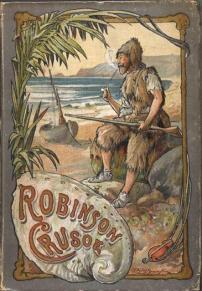
Title: Robinson Crusoe
Author: Daniel Defoe
The only memory I have of my father reading to me is when he read me Robinson Crusoe. I was ten. I don’t remember why, of all the moments, he chose to read this particular book to me – when I was already reading at a post collegiate level on my own and had been for awhile – when my sister and my mother had previously done most of the read-alouds in our family. Maybe it was good timing with work, maybe he was excited I was interested in it, who knows? Neither of us remembers at this point, twenty-five years later, but what we do know is this: It mattered.
So it was a pretty big deal to me when in February of 2018, I found myself in the car on a cross country road trip to the Creation Museum with my daughter, my dog, both my parents, and began reading Robinson Crusoe out loud in the car.
Robinson Crusoe was first published on April 25th, 1719, and even though we know it to be a novel now in 2019, it still has elements that lead first time readers to believe it to be a true account of a man’s travels. It was mistaken as such during its early release, an intentional marketing ploy by Daniel Defoe, because even in the 1700’s, sensational stories are sold most efficiently if we think they’re real. Look at James Frey and his Million Little Pieces “memoir.”
The first edition of the book touted Robinson Crusoe as both author and protagonist, but now we know that Crusoe is merely a character. In my personal opinion, not even the best character, I have always been most drawn to Friday.
There are many things inherently wrong with Robinson Crusoe if you look at the story from twenty-first century eyes: Robinson Crusoe works hard and then God blesses him to become a king-like fellow. One, that’s just not how God works, and many 1700’s boys and girls were then encouraged to be like Crusoe with this lordship at motivation. Two, it highlights the slave trade, and if you ask most modern Americans they’ll tell you this is a story of white supremacy, white privilege, oppression of all others, etc. etc.
Despite these hang ups, I love it. I think it’s a story that starts conversations. We need to be having conversations with our kids. What makes a protagonist? What makes a hero? What’s right? How do you feel about Crusoe and Friday’s relationship? Do you think this is appropriate? Do you think its duplicatable? Should it be duplicatable?
Kiddo was only seven when we read this together, but I think she got a lot of out of it and it definitely gave us a better view of the 1700’s as we studied all aspects of history. We got to the travel the world through the eyes of an author who lived during the times, and whether his worldview was good or bad, right or wrong, Defoe described it all vividly.
Advertisements